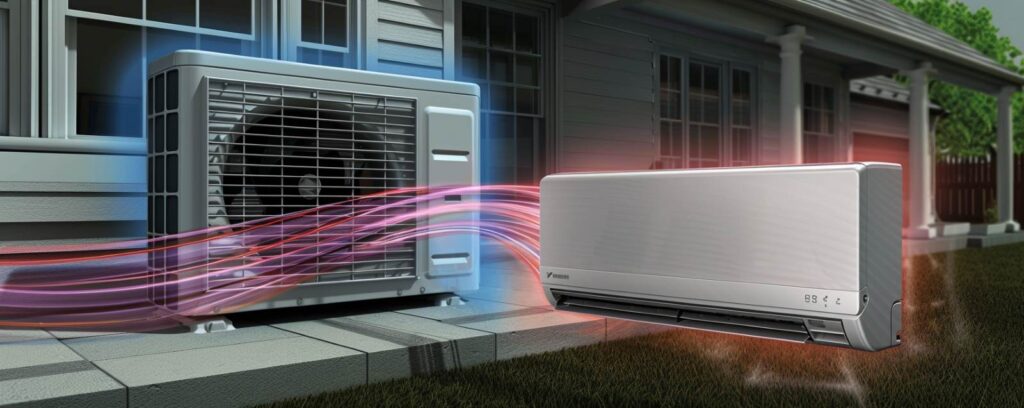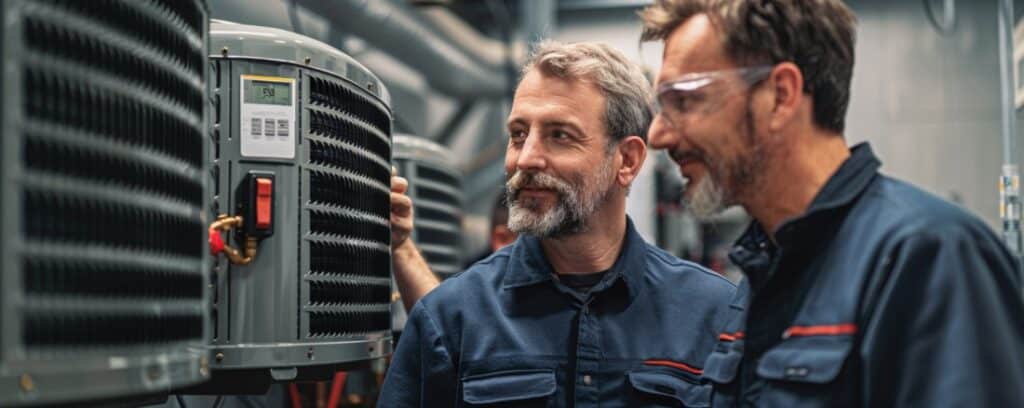The EPA 608 certification is a critical requirement for HVAC technicians working with controlled refrigerants in the United States. Established under the Clean Air Act, this certification ensures that technicians possess the knowledge and skills needed to handle refrigerants responsibly, protecting the ozone layer and preventing harmful environmental impacts.
For HVAC professionals, obtaining this certification is not just about legal compliance—it’s about embracing industry standards and demonstrating environmental responsibility. Whether you’re maintaining, repairing, or disposing of systems containing refrigerants, the EPA 608 certification is mandatory.
What Is the EPA 608 Certification?
The EPA 608 certification is a federally mandated credential required for HVAC technicians who handle controlled refrigerants. This certification ensures compliance with environmental regulations and minimizes the impact of refrigerants on the ozone layer.
Definition
The EPA 608 certification is a credential that validates a technician’s ability to maintain, service, repair, or dispose of appliances that could release controlled refrigerants. It guarantees that certified individuals are knowledgeable about refrigerant handling and environmental protection standards.
Legal Basis
The certification is required under the Clean Air Act, specifically outlined in 40 CFR Part 82, Subpart F. This regulation enforces proper handling of ozone-depleting substances and substitutes to protect the environment.
Who Needs It?
The certification is mandatory for:
- Technicians who attach or detach hoses and gauges to appliances containing refrigerants.
- Individuals adding or removing refrigerants or breaching refrigerant circuits.
Apprentices are exempt only if supervised by an EPA 608-certified technician, making it essential for those seeking independent roles.
Certification Duration
Unlike many professional certifications, EPA 608 certifications do not expire, ensuring technicians maintain compliance throughout their careers without the need for renewal.
Types of EPA 608 Certification
The EPA 608 certification offers four distinct types, each tailored to specific HVAC tasks and equipment. Understanding these types is essential for determining which certification aligns with your career goals.
Type I: Servicing Small Appliances
This certification is for technicians who service small appliances containing five pounds or less of refrigerant. Tasks may include maintaining or repairing household appliances such as refrigerators, freezers, and window air conditioners.
Type II: Servicing High-Pressure Appliances
Type II certification applies to the servicing or disposal of high-pressure appliances, excluding small appliances and motor vehicle air conditioning (MVAC) systems. Technicians in this category often work with commercial HVAC systems, such as rooftop units or split systems.
Type III: Servicing Low-Pressure Appliances
This certification focuses on low-pressure appliances, such as large chillers used in commercial and industrial environments. It ensures technicians are equipped to handle the specific recovery and leak detection challenges associated with low-pressure systems.
Universal Certification
Technicians seeking the Universal Certification must pass all three type-specific exams in addition to the core exam. This certification is ideal for those working across residential, commercial, and industrial HVAC sectors, as it covers the requirements of Type I, II, and III certifications.
Note: To achieve Universal Certification, the core exam must be proctored, ensuring strict adherence to EPA guidelines.
These certification options provide HVAC professionals with the flexibility to specialize or expand their expertise, depending on the scope of their work.
Exam Structure and Topics
The EPA 608 certification exam is designed to assess a technician’s knowledge of refrigerant handling, environmental protection, and system-specific practices. Understanding the exam structure and topics is crucial for successful preparation.
Core Exam
The Core Exam is mandatory for all certification types and covers foundational topics related to refrigerant management and environmental impact. Key topics include:
- Environmental Impacts of Refrigerants: Understanding ozone depletion, global warming potential, and the importance of the Clean Air Act.
- Refrigerant Handling Techniques: Recovery, recycling, and reclamation processes to minimize refrigerant emissions.
- System Operation and Safety Practices: Proper use of tools, personal protective equipment, and best practices for working with refrigerants.
- Shipping Protocols: Federal requirements for the safe transport of refrigerants.
Type-Specific Exams
In addition to the Core Exam, technicians pursuing certification for specific equipment types must pass type-specific exams. Each focuses on the unique requirements of the corresponding systems:
- Type I:
- Recovery requirements for small appliances.
- Use of refrigerant substitutes.
- Safety protocols and leak detection for compact systems.
- Type II:
- Handling high-pressure refrigerants.
- Leak detection and repair standards for high-pressure systems.
- Major repair practices and recovery techniques.
- Type III:
- Leak repair and recovery methods for low-pressure appliances.
- Safe handling of low-pressure systems, including chillers.
- Recognizing and mitigating unique hazards in low-pressure equipment.
Exam Format
- Question Structure: The exam consists of multiple-choice questions, with 25 questions for each section (Core and type-specific).
- Open Book: Candidates can use approved reference materials during the exam, ensuring access to critical information.
- Proctoring Requirement: For Universal Certification, the Core Exam must be proctored, either in person or through an online live proctoring service.
By understanding the exam structure and focusing on key topics, HVAC technicians can approach the EPA 608 certification exam with confidence.
EPA 608 Certification Cost
Obtaining the EPA 608 certification involves several costs that vary depending on the exam provider and preparation resources. Understanding these expenses can help technicians plan their certification journey effectively.
Exam Fees
The cost of taking the EPA 608 certification exam typically ranges from $25 to $150, depending on the testing provider. Fees may also vary based on the type of certification being pursued (Type I, II, III, or Universal).
Retake Fees
If a candidate fails an exam section, most providers charge an additional fee for retaking it. Retake fees are generally lower than the initial exam cost but vary by provider.
Study Resources
- Official Study Guides: Comprehensive guides provided by EPA-approved organizations often cost between $20 and $50.
- Practice Tests and Prep Courses: Third-party providers offer interactive tools, practice exams, and courses that may cost anywhere from $30 to $200, depending on the format and depth of materials.
Employer Sponsorship
Many employers recognize the importance of EPA 608 certification and may cover exam fees or reimburse preparation expenses. Check with your employer to see if financial support is available for your certification process.
By budgeting for exam fees, retakes, and study resources—and exploring employer sponsorship opportunities—technicians can manage the costs of achieving their EPA 608 certification.
Study Tips for the EPA 608 Certification Exam
Preparing for the EPA 608 certification exam requires a strategic approach that combines theoretical knowledge and practical skills. Utilizing the right study materials and techniques can significantly improve your chances of passing the exam.
EPA Study Guides
Start with the study guides provided by EPA-approved organizations. These guides cover the core and type-specific topics you’ll encounter on the exam, including environmental regulations, refrigerant handling, and system safety protocols. Look for guides that include visual aids like diagrams and practice questions for better understanding.
Third-Party Resources
Supplement your study plan with resources from third-party providers, such as:
- Interactive Courses: Online platforms offer interactive lessons tailored to EPA 608 exam topics.
- Mobile Apps: Some apps provide flashcards and quizzes for studying on the go.
- Practice Tests: Taking mock exams helps you familiarize yourself with the question format and identify areas for improvement.
Hands-On Practice
Pair theoretical study with real-world experience to reinforce your learning. Practicing tasks like refrigerant recovery, leak detection, and equipment handling builds the confidence needed to apply knowledge during the exam and on the job.
Focus Areas
Prioritize studying these critical topics:
- Clean Air Act Regulations: Understand the environmental rules governing refrigerant use and disposal.
- Refrigerant Recovery Techniques: Learn the correct methods for recovering, recycling, and reclaiming refrigerants.
- System Operation and Safety: Familiarize yourself with best practices for working with various HVAC systems.
By leveraging official guides, third-party tools, and hands-on practice, you can approach the EPA 608 certification exam with confidence and preparedness.
Career Benefits of the EPA 608 Certification
Earning the EPA 608 certification is more than just a legal requirement—it’s a career-enhancing credential that demonstrates professionalism, environmental responsibility, and technical expertise. Here are the key benefits of obtaining this certification:
Legal Compliance
The EPA 608 certification is mandatory for anyone handling refrigerants in the United States. By becoming certified, HVAC technicians ensure compliance with federal regulations, avoiding legal penalties and maintaining their eligibility to work in the field.
Job Opportunities
Certified technicians are more competitive in the job market. With the EPA 608 certification, you qualify for roles such as:
- HVAC Technician: Servicing, repairing, and maintaining residential and commercial HVAC systems.
- Refrigeration Specialist: Working on refrigeration systems in grocery stores, restaurants, and industrial settings.
- System Installer: Installing new HVACR systems and retrofitting older units to meet current standards.
Employers often prioritize certified candidates, recognizing their knowledge and commitment to industry standards.
Environmental Responsibility
The EPA 608 certification emphasizes the importance of protecting the environment by reducing ozone-depleting emissions. By handling refrigerants responsibly, certified technicians contribute to the industry’s sustainability goals and adhere to environmental protection standards.
Versatility
The certification is recognized across the HVAC industry, covering residential, commercial, and industrial systems. Technicians with the Universal Certification can work with a wide range of appliances, enhancing their versatility and earning potential.
By obtaining the EPA 608 certification, HVAC professionals can expand their career options, demonstrate their commitment to environmental stewardship, and gain a competitive edge in the workforce.
FAQ
What is the EPA 608 certification cost?
The cost of the EPA 608 certification exam varies depending on the provider but typically ranges from $25 to $150. Additional expenses may include study guides, practice tests, and retake fees if needed. Some employers may cover or reimburse these costs.
How long does the certification last?
The EPA 608 certification does not expire, meaning technicians only need to earn it once to remain certified throughout their careers.
What happens if I fail the EPA 608 certification exam?
If you fail any section of the exam, you will need to retake that section. Retake fees vary by provider, but many testing centers offer discounted rates for subsequent attempts.
Is it possible to get certified online?
Yes, the EPA 608 certification exam can be taken online through approved providers offering online live proctoring. This option provides flexibility for technicians who prefer to complete the exam remotely.
Do I need additional certifications or licensure to work in my state?
While the EPA 608 certification is federally required for handling refrigerants, many states have their own licensure requirements for HVAC technicians. These requirements vary and may include additional exams, certifications, or apprenticeships. For detailed information, check your state HVAC licensure requirements to ensure you meet all necessary qualifications.
Final Steps for Aspiring EPA 608 Technicians
Achieving the EPA 608 certification is a crucial step for any HVAC technician working with controlled refrigerants. By understanding the certification types, exam structure, and study resources, you can approach the process with confidence.
Key Takeaways
- Determine the certification type that aligns with your career goals, whether it’s Type I, II, III, or Universal Certification.
- Research EPA-approved certifying organizations and compare their testing options, including online and in-person exams.
- Invest in preparation by utilizing official study guides, practice tests, and hands-on training to ensure readiness.
With this credential, you’ll not only meet legal requirements but also enhance your job prospects, demonstrate environmental responsibility, and establish yourself as a trusted professional in the HVAC industry. Start your certification journey today to unlock new career opportunities and make a positive impact on the environment.



